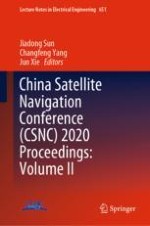2020 | OriginalPaper | Buchkapitel
Performance Evaluation and Analysis of Galileo Satellite Clock in Orbit
verfasst von : Yufeng Yang, Changsong Mei, Chenxin Qing, Lei Xia, Xiong Pan
Erschienen in: China Satellite Navigation Conference (CSNC) 2020 Proceedings: Volume II
Verlag: Springer Nature Singapore
Aktivieren Sie unsere intelligente Suche, um passende Fachinhalte oder Patente zu finden.
Wählen Sie Textabschnitte aus um mit Künstlicher Intelligenz passenden Patente zu finden. powered by
Markieren Sie Textabschnitte, um KI-gestützt weitere passende Inhalte zu finden. powered by
